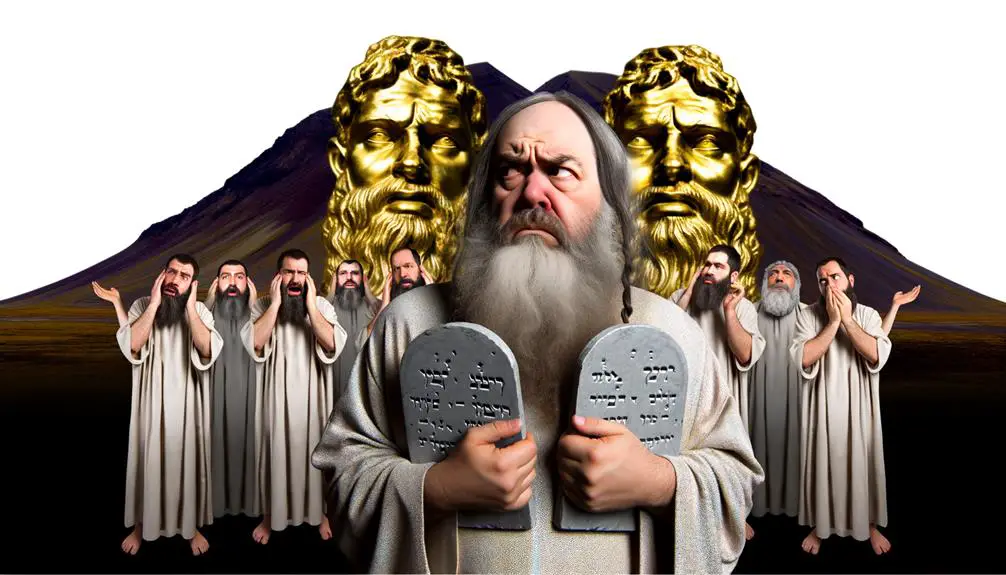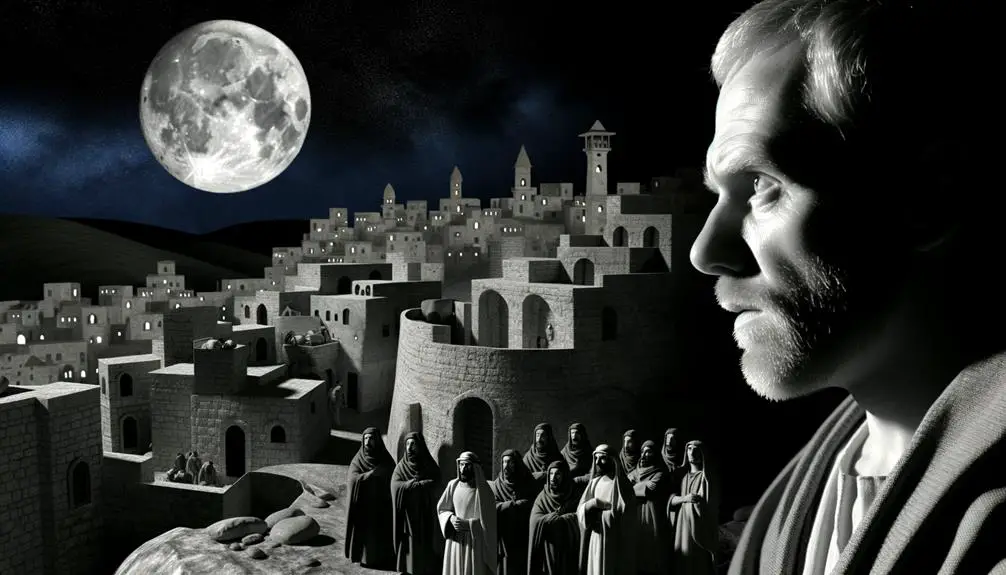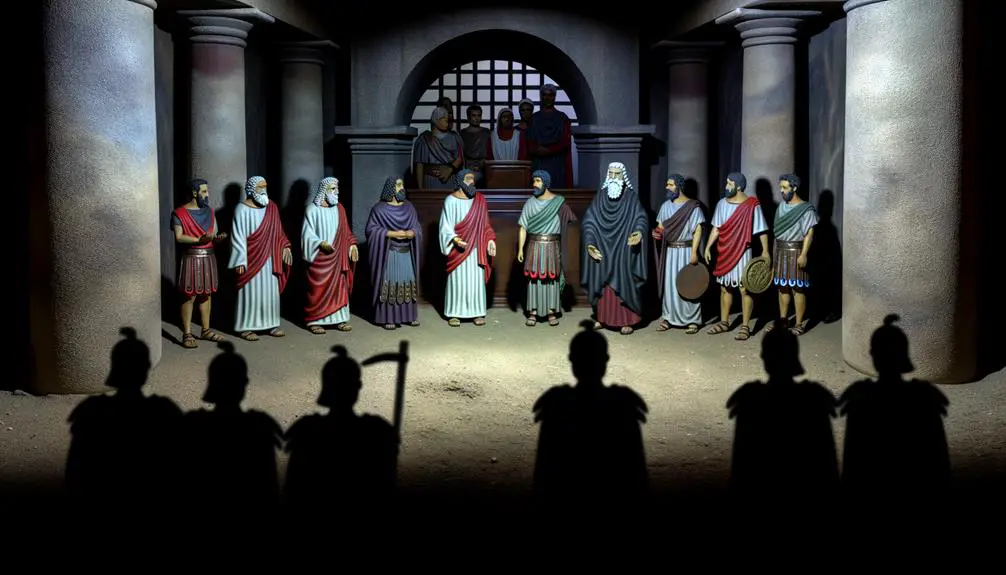Explore the intriguing instances of sedition in the Bible, from Eden to the Roman era, and uncover the complex interplay of faith and rebellion.

Sedition in the Bible
You might think that sedition, with its connotations of rebellion and insurrection, seems out of place in the sacred context of the Bible. However, the scripture is replete with instances where authority is questioned, and the status quo is challenged, from the Garden of Eden's notorious act of defiance to the complex dynamics of power surrounding King David and the Apostles' interactions with Roman rule.
These narratives offer a rich field for exploration, not just for their historical and religious significance but for the timeless lessons they impart on governance, faith, and resistance. Unpacking these stories promises to shed light on the multifaceted relationship between divine command and human agency, inviting you to look closer.
Key Takeaways
- Biblical narratives frequently explore the tension between obeying earthly authority and following divine commandments.
- Examples such as Korah's rebellion and the apostles' defiance of Roman authority highlight acts of sedition driven by faith.
- The apostles' strategic engagement with Roman legal frameworks showcases their nuanced approach to advocating their mission without direct confrontation.
- Sedition in the Bible often symbolizes a deeper spiritual struggle, underscoring the conflict between human governance and divine law.
Defining Biblical Sedition

In the context of the Bible, sedition refers to acts or incitements aimed at undermining authority or leading to rebellion against established leadership, particularly in a religious sense. This concept is woven throughout the biblical narrative, offering insights into the complexities of human governance and divine sovereignty. Two pivotal instances exemplify biblical sedition: Nebuchadnezzar's decree and the Tower of Babel.
Nebuchadnezzar's decree, as detailed in the Book of Daniel, serves as a stark illustration of sedition against divine authority. Nebuchadnezzar, in his hubris, demands worship as a deity, contravening the fundamental tenet of monotheism central to the Jewish faith. This act of sedition not only challenges the societal norms but also directly confronts the divine commandment against idolatry. The refusal of Shadrach, Meshach, and Abednego to comply with the decree underscores a critical aspect of biblical sedition: the tension between earthly authority and divine commandments.
Similarly, the narrative of the Tower of Babel encapsulates sedition against divine will. The collective endeavor to build a tower reaching the heavens reflects humanity's ambition to usurp divine prerogative and establish their own name and authority. This act of defiance leads to divine intervention, dispersing humanity and confounding their language. The Tower of Babel story highlights the inherent risks of collective sedition and the consequences of challenging divine authority.
These narratives underscore the biblical perspective on sedition as not merely a political or social insurrection but a profound moral and theological issue. They invite reflection on the balance between obedience to earthly authority and allegiance to divine mandates, a theme that resonates through the biblical text.
Rebellion in Eden

Exploring further instances of biblical sedition, the rebellion in Eden stands as a seminal moment where human defiance against divine commandment emerges. This event, central to the Judeo-Christian narrative, introduces the concept of Original Sin, a disobedience that fundamentally alters the human condition and relationship with the divine.
The narrative, as recounted in the Book of Genesis, hinges on the Serpent's persuasion of Eve, followed by Adam's compliance, to eat from the Tree of Knowledge of Good and Evil—directly contravening God's explicit command. This act of defiance isn't merely a transgression but a foundational sedition against divine authority, illustrating the complexities of freedom, temptation, and consequence.
The Serpent's role is pivotal, embodying the external tempter who challenges the status quo. Its persuasion isn't only a lure towards forbidden knowledge but also a subtle undermining of divine trustworthiness. This moment of seduction and the subsequent choice to eat the fruit represent a critical juncture in human autonomy and the propensity towards rebellion.
Original Sin, as a concept, then, isn't only about the act itself but also about the inherent capacity for sedition against divine order. It underscores a profound theological and philosophical point: that to err, to question, and to defy are intrinsically human traits.
The rebellion in Eden, therefore, isn't just an act of defiance, but a narrative that sets the stage for the ongoing human struggle with authority, morality, and the pursuit of knowledge. It encapsulates the eternal dichotomy between obedience and the quest for independence.
Moses and Israelite Dissent

Amidst the exodus from Egypt, Moses faced significant dissent within the Israelite community, marking a complex period of challenge to his leadership and divine directives. This era featured notable instances of sedition, notably the Golden Calf incident and Korah's rebellion, each illustrating the tension between divine command and human agency.
The Golden Calf incident serves as a seminal example of sedition against divine authority. While Moses communed with God atop Mount Sinai, the Israelites, in his absence, crafted a golden idol for worship. This act of creating and revering the Golden Calf represented not just a rejection of Moses' leadership but a direct challenge to the First Commandment. The incident underscores the Israelites' struggle with faith and obedience, highlighting the fragility of their covenantal relationship with God at a time when tangible leadership was absent.
Korah's rebellion, on the other hand, presents a more direct challenge to Moses' authority. Korah, along with Dathan, Abiram, and 250 community leaders, contested Moses and Aaron's roles, arguing for a more democratized religious leadership. This rebellion against Moses' leadership, and by extension God's chosen order, underscored deep divisions within the Israelite community concerning the nature of divine selection and human leadership.
Analyzing these episodes of dissent, it becomes evident that challenges to Moses' leadership were intricately tied to broader questions of faith, obedience, and the nature of divine authority. The Golden Calf incident and Korah's rebellion serve as critical junctures in the narrative of the Israelites, where the tension between divine command and human autonomy is starkly illustrated, offering profound insights into the complexities of leadership, faith, and governance.
David's Struggle for Power

Shifting focus to a later period in biblical history, we encounter David's ascent to power, fraught with internal and external challenges that underscore the enduring complexities of divine endorsement and human ambition. You'll find that David's journey is not a straightforward narrative of heroism but rather a nuanced exploration of leadership's moral and ethical dimensions.
Central to David's struggle is his Goliath encounter, a pivotal event that not only cements his status as a formidable warrior but also sows the seeds of Saul's jealousy. This jealousy marks the beginning of a tumultuous relationship between the incumbent king and his erstwhile ally, setting the stage for a broader discourse on the interplay between divine will and royal authority in biblical narratives.
Aspect |
Implication |
Outcome |
|---|---|---|
Goliath Encounter |
Establishes David's martial prowess |
Increased public favor |
Saul's Jealousy |
Erodes the relationship between Saul and David |
Political and personal strife |
Divine Endorsement |
Positions David as the legitimate successor |
Ensures eventual ascent to kingship |
Analyzing these elements, you'll uncover an intricate tapestry of ambition, divinely sanctioned power, and the inevitable human response to perceived threats to authority. David's struggle, therefore, is not merely a personal quest for power but a reflection of the broader human condition, characterized by aspirations, rivalries, and the quest for legitimacy.
In essence, David's ascent illuminates the nuanced dynamics between divine endorsement and human ambition, offering profound insights into the intersections of faith, power, and politics in biblical history.
Apostles and Roman Authority

In the context of Roman authority, the apostles' interactions reflect a complex dynamic of subversion and proclamation of a new kingdom. Their approach to Roman rule wasn't merely confrontational but also utilized the legal and societal structures of the time to further their mission. A pivotal example is Paul's citizenship, which he invoked on several occasions to protect himself and ensure his message could be disseminated without hindrance.
Analyzing Paul's strategic use of his Roman citizenship offers insights into the nuanced relationship between the early Christian movement and Roman governance. When faced with unjust treatment, Paul didn't hesitate to assert his rights as a Roman citizen, a move that often led to a reevaluation of his case by Roman authorities. This action wasn't just about personal safety; it was a calculated effort to legitimize the Christian message within the legal frameworks of the empire.
Moreover, the apostles' response to Caesar's decree and other imperial edicts highlighted their allegiance to a higher authority while still navigating the complexities of Roman law. They didn't outright reject Roman authority but positioned their faith as transcending earthly powers. This stance wasn't only revolutionary but also a means to spread their teachings more effectively amidst a hostile environment.
The apostles' engagement with Roman authority, therefore, reveals a sophisticated understanding of the political and social landscape. They leveraged their rights, respected the law, and yet remained unwavering in their commitment to a kingdom not of this world, illustrating a profound balance between earthly citizenship and divine allegiance.
Frequently Asked Questions
How Have Interpretations of Biblical Sedition Influenced Modern Legal Systems Regarding Freedom of Speech and Protest?
You're exploring how interpretations of sedition have shaped today's legal definitions, especially regarding freedom of speech and protest. By examining historical context, you'll find that these biblical interpretations have significantly influenced modern legal systems.
This influence is critical in understanding how laws around sedition have evolved. Essentially, the roots in religious texts have provided a foundation for legal frameworks, highlighting the complex relationship between historical teachings and contemporary legal principles.
What Parallels Can Be Drawn Between Biblical Accounts of Sedition and Contemporary Political Movements or Uprisings?
You're exploring how ancient rebellions resonate with contemporary political movements or uprisings, delving into historical patterns and ideologies.
By comparing these instances, you'll notice that both ancient and modern parallels share underlying causes like oppression and the quest for freedom.
This analytical approach sheds light on the continuity of human resistance against authority.
Your investigation into these similarities provides a comprehensive understanding of how past insurgencies inform present-day acts of protest and defiance.
Are There Examples of Sedition in the Bible That Were Later Viewed Positively in Christian Theology, Highlighting a Shift in Moral Perspective Over Time?
You're delving into how acts of rebellion, initially branded as sedition, have been reinterpreted within Christian theology, showcasing a fascinating shift in moral perspectives. This exploration touches on the complex dynamics between rebellion and authority, revealing how what was once condemned can be seen in a new light.
Through an analytical lens, you're uncovering instances where defiance against established order was later justified, pointing to a transformative evolution in the understanding of authority dynamics.
How Do Different Denominations or Religious Scholars Reconcile the Concept of Divine Authority With the Right to Challenge Human Authority, as Seen in Biblical Stories of Sedition?
You're exploring how denominations reconcile divine authority with challenging human authority.
They delve into biblical stories, viewing acts of divine disobedience through the lens of authoritative interpretations.
This analysis often highlights a nuanced understanding of authority, where divine commands might justify challenging human rulers.
Scholars debate these interpretations, considering context and evolving moral perspectives.
This approach helps believers navigate the complex interplay between submitting to God and resisting unjust human leadership.
In What Ways Have Artists, Writers, and Filmmakers Used Biblical Narratives of Sedition to Comment on or Critique Societal Issues and Governance?
You might think tales of rebellion are outdated, but artists, writers, and filmmakers often use these stories to reflect on modern societal issues and governance.
Through artistic license and narrative adaptation, they bring fresh perspectives to age-old debates about authority and resistance. This approach not only makes ancient stories relevant today but also allows for a deep, analytical examination of how power dynamics influence human behavior and societal structures.
Conclusion
In exploring biblical sedition, you've navigated through gardens of dissent and climbed mountains of rebellion. From Eden's first defiance to the Apostles' challenges against Roman authority, these stories underscore a core human inclination towards autonomy.
Like a river carving through rock, these acts of sedition have shaped the landscape of faith and governance, illustrating the complex dance between divine command and earthly authority.
This journey reveals not just historical events, but the enduring human spirit's quest for freedom and justice.



Sign up